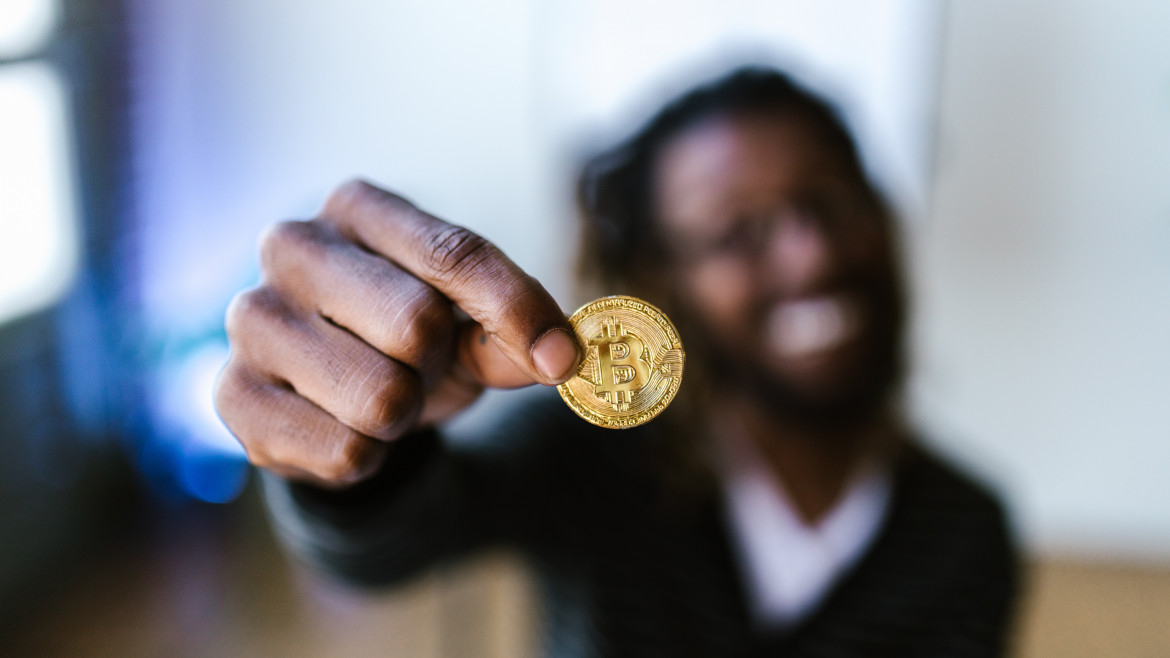Chris is the Kenyan Community Manager for crypto.com , a cryptocurrency and blockchain exchange company that also deals with NFTs.
What is a community manager?
A community manager is an interface between a company and its users. My role involves getting feedback from users and helping them understand how to use the company’s products on an online platform. So that means I’m mostly on the phone talking directly to users or interacting with them on our communities in Telegram.
How did you get your current role at Crypto.com?
I started working for crypto.com in early 2020 but my journey dates back to 2016.
My chama friends and I were looking for things to invest in so we started floating ideas around. None of them resonated with everyone in the group until one friend brought up bitcoin. It sounded interesting but no one knew how to go about investing in it. Realising that there was untapped potential here, I decided to devote my time and energy to understanding what this whole cryptocurrency was about.
But very early on in this journey, I faced a huge challenge. The resources online, for beginners specifically, were so limited. And so I asked myself, why can’t I be the one to start writing these articles? Because from experience, when you write about something it forces you to research more and it helps you understand better so you can explain it comprehensively to someone else. And that was the breakthrough.
The breakthrough
My friends and I created a website called coinweez.com and started writing basic crypto 101 content.
And what do you know? Within 2 or 3 months, we found exactly what we had been looking for, a gap that we were able to fill. We discovered there’s a whole new industry that doesn’t involve being a coder, a developer or a trader. We could actually be content creators in crypto. So we started looking for people and companies to write for. We’d write PR and research articles for them on their websites and marketing platforms. This was in 2017, a year after we’d started. And so that’s how I got my foot in the door. By creating crypto content.
The more my interest grew, the more I sought out ways to continue working in the industry. And I realised aside from writing, there is marketing, there is community.
Basically crypto is like any other industry out there that has all types of employees. So then I started looking for big platforms that I could work for. And that’s how I ended up at Crypto.com, being their first Kenyan and African to join their team.
Funnily enough, there wasn’t even a specific role for a Kenyan community manager. I kept checking their “Careers” page from time to time. There was a role called “Community manager” but then it was global. It wasn’t specified to a certain country.
I honestly don’t know what specifically led me to apply but one day I just said, let me just shoot my shot. I wrote an email, explaining to them where I am and the opportunity here. The role didn’t specify that they were looking for someone in any specific country but I was thinking if they’ll ever have someone from Africa or Kenya, it could as well be me.
I sent the email and forgot about it. Then one day they called me. I just never expected to get a call back so I was quite surprised. But then we talked, and they asked me why I applied and to share more about the opportunities available in Kenya. What gave me the edge was my website and content portfolio. They could see I knew my stuff and could walk the talk, so to speak. And the rest, as they say, is history.
What would you say is the worst part of your job?
The worst, as with every customer-facing role, is angry consumers.
These instances are few and far between, but once in a while, some people can even get abusive. It’s part of the job and so you take it in stride. What helps me is taking breaks as often as I need to. Gradually I’ve learned how to deal with people better. For example, now I know when someone becomes abusive, you don’t respond at all. You just block them.
I think it’s also important to show them you’re human also. Most people forget that there’s an actual person at the other end of the screen. So you learn to reach out to them as humanly as possible and this has proven effective for me so far.
And the best part?
I get to work with the best of the best in the industry globally, right here from my home in Nairobi. That’s crazy. We couldn’t do that 10 years ago. I have colleagues on every continent now and sometimes it blows my mind that I can actually reach out to these people and ask them questions about anything. It’s really expanded my mind, given me a lot of perspectives, and exposed me to so many different cultures.
Another fun part is since I work in crypto, I also invest in crypto. So when I’m paid, I still invest my money in the same digital assets that I’m selling. I gain more information that way. It’s like a cheat code. I get to see which projects are viable because that’s part of my daily job and then it gives me ideas to explore. Even if you can’t implement them, you still learn a lot.
How do you stay motivated and prevent burnout?
I design my time to accommodate my daily objectives, with enough legroom of course.
For me that looks like focusing for 3-4 hours a day on my tasks, taking multiple breaks, and going outside for a walk in the evenings. What I’ve found works wonders is changing my workstations around the house. I’m not at my desk all day. In the afternoon, for example, I go outside to work in the sun. And sometimes I listen to music when I’m not doing intensive work. So keeping things fluid helps me a lot, and making sure the place I’m working from is ideal. I’ve invested in my workstation. I have good aeration, enough sunlight, a nice desk and chair. These small aspects ensure I’m comfortable when working from home. I also go to co-working spaces or a restaurant once or twice a week. The benefit of co-working spaces is a change of environment and interaction with new people,. You sometimes end up finding like-minded people in the industry and exchanging ideas, which helps you grow.
What advice would you give someone who wants to work in the crypto space?
Luckily, crypto doesn’t require you to be technical, unless, of course, you are, and that’s what you want to do. But if you’re not, you can find other ways of contributing to the industry.
Like any normal company, there are various things you can do from marketing to products, to being a developer, legal, etc. So first, identify which area you’re interested in most, then look for these crypto companies. Research widely about what they do and the products they have. If you can, join some online communities because communities are now the epitome of company management in the modern world.
For me, creating crypto content was my foot in the door. I even built a website to help me showcase my work. If you want to stand out and catch the eye of big companies, start working on something yourself to show your interest or experience in the field. Start with a small side project, or do some freelancing work. Build your portfolio, develop something, design something, buy crypto, and showcase it. Anything you can do to give you the upper hand because it’s really competitive out here.
Aside from work, how would you describe yourself?
I’m an experimenter, a historian, a traveller and an explorer. If I wasn’t working in the crypto field, I’d be a historian. Not the teacher, but the person who discovers ancient places, charting what happened in history and then revealing it to the modern world. I’m curious about extraordinary phenomena.

